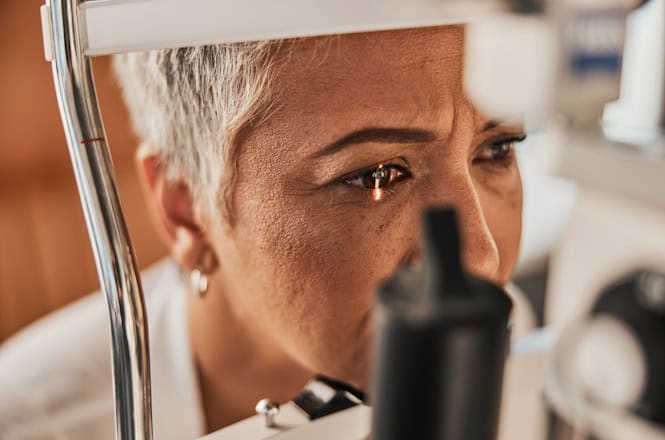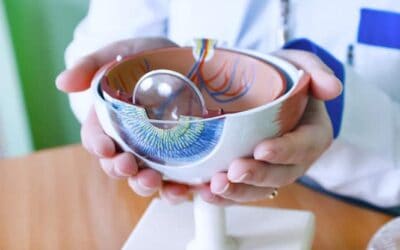What Is a Cataract?
A cataract is a cloudy area that begins to form in your eye’s natural lens, which blocks light from coming through the lens, leading to symptoms such as blurry vision.
The word cataract is derived from the Latin word “cataracta,” the word for “waterfall,” and an earlier Greek word, “katarassein,” which means “to dash down.” When cataracts form, the cloudiness may make it seem like you’re looking through a waterfall.
What Causes Eye Cataracts?
Cataracts begin to form when your natural lens’s proteins begin to break down. Some people experience cataracts due to eye injuries, genetic vision problems, steroid medications, or medical conditions, such as diabetes. Cataracts are a normal part of aging.
Research also shows that cataracts may also be more prevalent in those who smoke, drink excessive amounts of alcohol, or spend time in the sun without protective sunglasses.
What Are the Most Common Symptoms Of Cataracts?
Less common symptoms include:
Get Rid Of Cataract Symptoms With a Free Consultation at Durrie Vision
Cataracts Get Worse In Stages
Stage One
Because of near vision loss, you become more dependent on readers, bifocals, or multifocal contact lenses.
Stage Two
You have more difficulty seeing at night, lights at night have a “halo” effect or glare, and you need more light to read in a dim room.
Stage Three
Cataracts form, and you begin to experience more intense symptoms, including cloudy or blurry vision.

How Do I Know If I Have Cataracts?
Most people discover they have cataracts after experiencing cataract symptoms and go to an ophthalmologist or optometrist to get their eyes checked. At this point, their doctor recommends refractive cataract surgery.
You can skip this step by meeting with our board-certified ophthalmologist and refractive surgeon, who can diagnose and treat your cataracts with the latest technology.
Schedule a free consultation to find out how we can help get rid of the symptoms of cataracts so you can see and live more fully.
How Do You Treat Cataracts?
Surgery is the only way to get rid of cataracts. Office-based refractive cataract surgery is the most advanced and effective cataract treatment. Refractive cataract surgery removes your aging lens and replaces it with an intraocular lens (IOL), so you can see at near, intermediate, and far distances.
Get both eyes treated on the same day in our comfortable office, instead of a surgery center. We can also fine-tune your vision after your procedure.
Everyone’s symptoms and customized treatment plan are different, and our Advanced Ocular Analysis (AOA) helps determine your needs. Book your appointment with Durrie Vision to bring your vision and enjoyment of life into focus.
Don’t just take our word for it!
Schedule a Free Consultation
During your free consultation visit, you will meet with an experienced refractive surgeon who will discuss your results along with a custom recommendation for treatment.
Take the LASIK Eligibility Assessment
Are you a candidate for laser vision correction? Let’s find out. Take our 60-second online test to see what procedure might be the best option for your vision and lifestyle.
From The Experts At Durrie Vision
The Only Resource You’ll Ever Need to Understand Your Options for Cataract Surgery
Restore Your Vision With Confidence Blurry, cloudy, or yellowing vision. Halos around lights. Difficulty seeing at night. If you’ve experienced the worrisome symptoms of cataracts, you need a resource that helps you care for these challenges to your vision. Cataract...
How Can I Prevent Cataracts in My Eyes?
And Is There a Laser Vision Correction Procedure to Treat Them in Kansas City? Cataracts negatively affect your vision. If you or a loved one has developed them, then you know how hard they make it to see clearly, especially in dimly-lit environments. As you age, your...
Top 4 Benefits of Cataract Surgery in Kansas City
Not Your Typical Laser Vision Correction, Cataract Removal Restores Sight in Older Adults Cataract surgery is an outpatient procedure that involves removing the eye’s clouded lens and replacing it with a clear artificial lens. Cataracts are almost inevitable as we...






